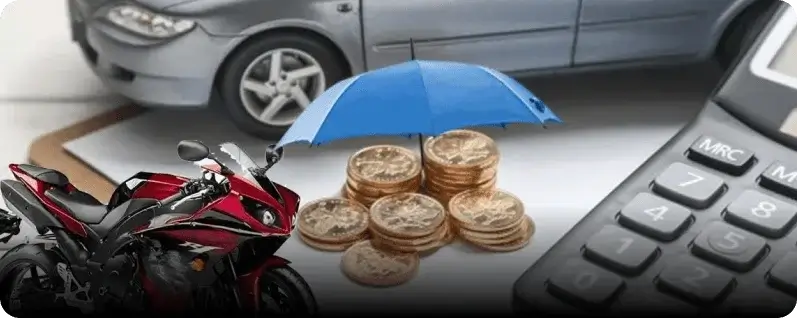
TABLE OF CONTENTS
- What Is Auto Insurance?
- What Is Car Insurance Premium?
- What Is An Auto Insurance Score?
- How Does Car Insurance Work?
- Why Is Car Insurance Important?
- How Much Does Car Insurance Cost?
- What Are The Factors That Affect Car Insurance Costs?
- Why Is Car Insurance So Expensive?
- What Is Full Coverage For Car Insurance?
- What Does Car Insurance Cover?
- What Car Insurance Doesn’t Cover
- How Much Car Insurance Do I Need?
- Why Is My Car Insurance So High?
- How To Compare Car Insurance
- How To Get Cheap Car Insurance?
- Can I Buy Car Insurance Online?
- Can I Get Car Insurance Without A Car?
- Can You Get Car Insurance Without A License?
- Can You Have Two Auto Insurance Policies?
- Can You Cancel Car Insurance At Any Time?
- Conclusion
KEY TAKEAWAYS
- This insurance guide includes various coverage types, including liability, collision, comprehensive, uninsured motorist, and personal injury protection. Knowing what each type covers can help you choose the right policy for your needs.
- Assess your driving habits, vehicle value, and personal financial situation to determine the appropriate amount of coverage. Consider factors like state requirements and whether you need additional coverage beyond the minimum.
- Your driving record, age, location, vehicle type, and credit score influence your insurance premiums. Understanding these can help you find ways to lower your premiums.
- Compare quotes from multiple insurance providers to find the best deal. Look for discounts, consider bundling policies, and review customer service ratings to ensure you get both value and quality service.
- To reduce your auto insurance costs, increase your deductible, maintain a good driving record, take advantage of discounts (such as multi-policy or good student discounts), and consider usage-based insurance programs.
What Is Auto Insurance?
Auto Insurance is a contract between you and an insurance company that protects you against financial loss in the event of an accident or theft. In exchange for your premium payment, the insurance company agrees to cover your losses as outlined in your policy. Insurance policies typically include several types of coverage, such as liability, collision, comprehensive, uninsured motorist, and personal injury protection.
Understanding these coverage types and selecting the right policy can provide peace of mind and financial protection, ensuring you are prepared for unexpected events.

What Is Car Insurance Premium?
A car insurance premium is a policy that provides financial protection against physical damage or bodily injury resulting from traffic collisions and against liability that could also arise from incidents in a vehicle. Depending on the policy's terms, it covers repairs, medical expenses, and third-party property damage.
The policyholder pays a premium in exchange for this coverage. This insurance protects against theft, vandalism, and natural disasters. It is legally required in most places to operate a vehicle, ensuring that drivers can cover potential damages or injuries they may cause while driving.
What Is An Auto Insurance Score?
This insurance score is a numerical rating used by insurance companies to assess the risk of insuring a driver. It is calculated based on various factors, including your credit history, driving record, claims history, and other personal information. The score helps insurers predict the likelihood of a policyholder filing a claim.
A higher insurance score generally indicates a lower risk, which can result in lower insurance premiums. Conversely, a lower score may lead to higher premiums. Maintaining a good credit history, a clean driving record, and fewer claims can help improve your insurance score.

How Does Car Insurance Work?
Car insurance operates on a system of premiums and regular payments made to the insurance company to maintain your coverage. These premiums can be paid monthly, semi-annually, or annually, depending on your preference and policy terms. The amount you pay is influenced by several factors, including your driving history, the type of car you own, and even your location. Paying these premiums ensures that your coverage remains active and that you are protected financially in the event of an accident or damage to your vehicle.
When you need to claim your car insurance, you'll encounter the concept of deductibles. A deductible is the amount you agree to pay out of pocket before your insurance coverage takes effect. For example, if you have a deductible of $500 and the repair cost is $2,000, you would pay the first $500, and your insurance would cover the remaining $1,500. Opting for a higher deductible often results in lower premiums, as you agree to cover more initial costs in the event of a claim.
Filing a claim begins when your vehicle is involved in an accident or sustains damage. You will contact your insurance company to report the incident and provide details about what happened. The insurance company will then assess the situation to determine the extent of the damage and the compensation amount based on your policy coverage. This step is crucial for ensuring that the appropriate repairs are made and you receive the financial support you need.
Why Is Car Insurance Important?
Financial Protection: Covers repair costs, medical expenses, and legal fees arising from accidents.
Legal Requirement: Most states require minimum liability coverage to operate a vehicle legally.
Liability Coverage: Protects you from financial responsibility if you cause damage or injury to others.
Uninsured Motorist Coverage: This policy ensures you're covered if you're in an accident with an uninsured or underinsured driver.
Peace of Mind: Provides reassurance that you are protected against unexpected events on the road.
How Much Does Car Insurance Cost?
These insurance costs vary widely based on age, location, driving history, and coverage level. On average, insurance costs around $1,200 per year or $100 per month, though individual premiums may differ significantly. It's essential to compare quotes from multiple providers to determine the best rate for your situation.
Your final cost will depend on various personal and geographic factors, so shopping around is crucial to finding the most affordable and appropriate coverage. Always tailor your insurance to your unique needs to ensure you're adequately protected without overpaying.

What Are The Factors That Affect Car Insurance Costs?
Driving History: Accidents or traffic violations can increase premiums.
Age: Younger drivers typically pay higher rates due to inexperience.
Location: Urban areas with high traffic and theft rates lead to higher premiums.
Vehicle Type: Expensive or high-performance cars cost more to insure.
Credit Score: Better credit scores often result in lower premiums.
Coverage Level: Higher coverage limits and additional options increase costs.
Mileage: Higher annual mileage can raise premiums due to increased risk.
Gender: Statistically, males, especially young ones, may have higher rates.
Marital Status: Married individuals often receive lower rates.
Deductibles: Higher deductibles can lower your premium.
Claims History: Frequent claims can lead to higher premiums.
Occupation: Certain jobs, especially those requiring extensive driving, can affect rates.
Safety Features: Vehicles with advanced safety features may receive discounts.
Anti-Theft Devices: Cars equipped with anti-theft systems can have lower premiums.
Policy Bundling: Bundling auto insurance with other policies (home, life) can reduce costs.
Insurance Provider: Rates can vary significantly between different insurance companies.
Why Is Car Insurance So Expensive?
Vehicle Repair Costs: Advanced technology and parts increase repair expenses.
Medical Expenses: Rising healthcare costs impact injury claims.
Accident Rates: High accident rates lead to more claims.
Litigation Costs: Legal fees and settlements contribute to higher premiums.
Insurance Fraud: Fraudulent claims increase overall costs for insurers.
Uninsured Drivers: Costs are spread among insured drivers to cover uninsured motorist claims.
High-Risk Areas: Living in areas with high crime or accident rates can raise premiums.
What Is Full Coverage For Car Insurance?
Package or comprehensive insurance is a combination of various classes of insurance that offer complete coverage for vehicles. It usually provides liability coverage, collision coverage, and comprehensive coverage.
While liability coverage is where you are legally responsible for the damages you have inflicted on others’ property, collision coverage is where your vehicle becomes damaged in an accident. They include all comprehensive coverage types of theft, vandalism, and natural disasters.
This coverage type provides comprehensive coverage in many situations and provides automobile insurance on the road. However, it provides a much broader scope of coverage and, therefore, costs more than basic liability insurance.

What Does Car Insurance Cover?
Here are some of the risks that this insurance can cover for a driver. There are often two types of insurance: liability insurance, which is where, in an accident, your insurer pays for any damages or injuries you have contributed to.
This includes collision insurance, which makes you liable to get your car repaired after an accident, and comprehensive insurance, which offers a warranty against events other than accidents, such as theft or natural calamities.
Other components include personal injury protection (PIP), medical expenses, uninsured/underinsured motorists, and more. These vary with the policy type you select and the optional extras accompanying it.
Liability Coverage
Liability coverage is a fundamental component of insurance that pays for damages or injuries you cause to others in an accident where you are at fault. This coverage is typically divided into two parts: bodily injury liability and property damage liability.
Bodily injury liability covers medical expenses, lost wages, and legal fees if someone is injured in an accident you caused. In contrast, property damage liability covers the cost of repairs or replacement for damaged vehicles, buildings, and other property resulting from the accident.
Collision Coverage
Collision coverage is an essential part of insurance that pays for repairs to your vehicle if it is damaged in an accident, regardless of who is at fault. This includes accidents with other vehicles, collisions with objects like trees or poles, and single-car accidents such as rollovers.
Comprehensive Coverage
Comprehensive coverage is a type of insurance that protects your vehicle from non-collision-related incidents. This includes theft, vandalism, natural disasters (such as floods, hurricanes, and earthquakes), fire, falling objects, and animal collisions.
Comprehensive coverage also typically covers damage from civil disturbances, like riots or protests.
Personal Injury Protection (PIP)
Personal Injury Protection (PIP) is insurance coverage that pays for medical expenses, lost wages, and other related costs if you or your passengers are injured in an accident, regardless of who is at fault.
PIP can also cover expenses such as rehabilitation, funeral costs, and essential services like childcare or housekeeping if you cannot perform these tasks due to injury.
Medical Payments Coverage
Medical Payments Coverage, often called MedPay, is an optional insurance coverage that helps pay for medical expenses resulting from a car accident, regardless of who is at fault. This coverage can be used for medical bills, hospital visits, surgeries, X-rays, and funeral expenses.
MedPay can also cover injuries sustained by your passengers, providing financial assistance for their medical needs.
Uninsured/Underinsured Motorist Coverage
Uninsured/Underinsured Motorist Coverage is a crucial component of insurance that protects you if you're involved in an accident with a driver who lacks insurance or has insufficient insurance to cover the damages.
Uninsured motorist coverage pays for your medical expenses, lost wages, and other related costs if the at-fault driver is uninsured.
Gap Insurance
Gap insurance is an optional insurance coverage that covers the difference between the actual cash value of your vehicle and the amount you still owe on your car loan or lease in the event of a total loss.
This situation often arises when the value of your car depreciates faster than the loan balance. If your vehicle is totaled in an accident or stolen, standard insurance typically pays only the car's current market value, which may be less than what you owe.
Roadside Assistance
Roadside assistance is an optional coverage that provides help when your vehicle experiences a breakdown or other issues while on the road. This service can include towing, battery jump-starts, flat tire changes, fuel delivery, lockout assistance, and minor mechanical repairs.
It ensures you are not stranded and can return to the road quickly and safely.
Rental Reimbursement Coverage
Rental reimbursement coverage is an optional add-on to your insurance policy that pays for the cost of a rental car while your vehicle is being repaired due to a covered claim, such as an accident.
This coverage ensures that you have a means of transportation while your car is in the shop, helping you avoid the inconvenience and additional expense of renting a vehicle out-of-pocket.
New Car Replacement Coverage
New Car Replacement Coverage is an optional insurance feature that helps cover the cost of replacing your new vehicle with a brand-new one of the same make and model if it is totaled in an accident, typically within the first to two years of ownership.
This coverage is beneficial because it accounts for the rapid depreciation of new cars, ensuring you receive enough compensation to purchase a new vehicle rather than just the depreciated value.
What Car Insurance Doesn’t Cover
While this insurance provides crucial protection against various risks and unexpected events, it typically does not cover certain situations and types of damage. Understanding these exclusions is essential for avoiding surprises and ensuring you have the appropriate coverage for all aspects of vehicle ownership.
Below are some common exclusions found in standard insurance policies.
Routine Car Maintenance
This insurance does not cover routine maintenance tasks such as oil changes, tire rotations, brake pad replacements, or other regular upkeep services. These are considered part of the normal responsibilities of vehicle ownership.
Routine maintenance is essential for keeping your car in good working condition but is not included in standard insurance policies. Vehicle owners are expected to budget for and manage these costs separately.
Using Your Car for Business
Standard insurance policies typically do not cover incidents while using a vehicle for business purposes, such as delivering goods or providing ride-sharing services.
If you use your car for business activities, you will need a commercial auto insurance policy to cover any accidents or damages during business use. This ensures you are adequately protected while conducting business-related driving tasks.
Damage That Exceeds Your Limits Of Liability
These insurance policies have coverage limits, and any damage or liability that exceeds these limits will not be covered. For example, suppose you're at fault in an accident, and the costs of damages and medical expenses surpass your policy's liability limits.
If so, you will be personally responsible for paying the remaining amount. Choosing appropriate coverage limits is important to protect your financial interests adequately.
Damage Caused By Normal Wear And Tear
This insurance does not cover damage from normal wear and tear, such as worn-out tires, brake pads, or aging parts. These issues are part of routine vehicle maintenance and are the owner's responsibility.
Insurance is designed to cover unexpected events like accidents, theft, or natural disasters, not the gradual deterioration that occurs with regular vehicle use.
Personal Belongings
Car insurance does not cover personal belongings inside your vehicle, such as laptops, smartphones, or other valuables. If these items are stolen or damaged in an accident, your insurance policy will not provide compensation.
Instead, you would need to rely on a homeowners' or renters' insurance policy to cover the loss or damage of personal items in your car.
How Much Car Insurance Do I Need?
To decide how much insurance you should have, consider your budget, driving patterns, and state laws. The legal minimum liability insurance is the insurance you should have to protect other drivers and their property if you cause an accident.
However, consider adding collision and comprehensive coverage to your policy if you need higher coverage. Other considerations that should apply are the value of the car you drive, medical bills in the event of an accident, and your ability to handle risks.
Increased limits and extra choices, such as UM/UIM and PIP, can offer greater protection than the basic auto insurance policy. It is important to have good coverage yet avoid incurring too much expense, making paying your premiums difficult.

Why Is My Car Insurance So High?
Several factors can contribute to high insurance premiums. Your driving record and any accidents or traffic violations significantly impact your rates. Younger or inexperienced drivers typically face higher premiums due to the increased risk. The type of vehicle you drive also matters; expensive, high-performance or newer cars cost more to insure.
Your location plays a role, as areas with higher accident rates, crime, or dense traffic often lead to higher premiums. Poor credit scores, frequent claims, low deductibles, or extensive coverage can also increase costs. Understanding these factors can help you manage and power your insurance expenses.
How To Compare Car Insurance
Comparing insurance involves several steps to ensure you find the best coverage at the most affordable price. Start by gathering quotes from multiple insurance providers online or through agents. Evaluate each policy's coverage options and limits, ensuring they meet your needs. Check for discounts you may qualify for, such as safe driver, multi-policy, or low-mileage discounts. Review customer service ratings and claim handling experiences to gauge the insurer’s reliability.
Finally, the financial strength of the insurance companies should be considered to ensure they can pay claims. You can decide on the best car insurance policy by comparing these aspects.
How To Get Cheap Car Insurance?
To get cheap insurance, compare quotes from multiple insurers to find the best rates. Consider increasing your deductible, which can lower your premium. Maintaining a good driving record and improving your credit score can significantly impact your rates. Look for discounts such as bundling policies, safe driver, low mileage, or student discounts. Opt for a vehicle with safety features and a lower risk profile.
Additionally, periodically review and update your coverage to ensure you’re not paying for unnecessary options. These steps allow you to find more affordable insurance without sacrificing essential coverage.
Can I Buy Car Insurance Online?
Yes, you can buy insurance online easily and conveniently. Most insurance companies offer online platforms where you can compare quotes, customize coverage options, and purchase a policy. The process typically involves providing personal information, vehicle details, and driving history to receive accurate quotes. Once you select a policy, you can purchase online, often within minutes.
Buying insurance online allows you to quickly compare different insurers and find the best deal without needing an in-person visit or phone call. It’s a streamlined way to secure the coverage you need from the comfort of your home.
Can I Get Car Insurance Without A Car?
You can get insurance without owning a car through a non-owner insurance policy. This policy provides liability coverage when you drive a vehicle you don’t own, such as a rental or a borrowed car. It can also offer protection if you frequently use car-sharing services or want to maintain continuous insurance coverage to avoid higher rates in the future.
Non-owner insurance doesn’t cover damage to the vehicle you’re driving or personal injuries, so it’s important to understand its limitations. This coverage is a practical solution for drivers without their vehicles.
Can You Get Car Insurance Without A License?
While uncommon, you can get insurance without a driver’s license. Insurers may issue a policy if you list a licensed primary driver as the main operator of the vehicle. This situation often applies to individuals who own a car but cannot drive, such as older adults, those with medical conditions, or those with suspended licenses.
The primary driver must have a clean driving record and meet the insurer’s requirements. Securing insurance without a license can be more challenging and may require additional documentation, but it is possible under specific circumstances.

Can You Have Two Auto Insurance Policies?
Having two insurance policies is possible, but it’s generally unnecessary and complicated. Typically, each car should be insured under a single policy to avoid duplication of coverage and potential conflicts during a claim. However, in some cases, drivers may have different policies for specific needs, such as business use or multiple vehicles in different locations.
Having two policies on the same vehicle can lead to coordination of benefits issues, where each insurer might dispute responsibility for a claim. Understanding the implications and communicating with both insurers is essential to ensure proper coverage and avoid complications.
Can You Cancel Car Insurance At Any Time?
Yes, you can cancel your insurance anytime, but it’s important to consider the consequences. Some insurers may charge a cancellation fee or require written notice. Ensure you have a new policy in place before canceling to avoid a lapse in coverage, which can lead to higher premiums in the future.
If you cancel mid-term, you may be entitled to a prorated refund for the unused portion of your premium. Always check your policy terms and speak with your insurer to understand the specific cancellation process and any potential penalties to avoid unexpected costs or coverage gaps.
Conclusion
This comprehensive insurance guide covers insurance's essentials, importance, cost factors, and key considerations. Understanding auto insurance is crucial for financial protection and legal compliance, as well as for providing peace of mind and safeguarding against unforeseen events.
Insurance costs vary significantly based on driving history, vehicle type, location, and coverage level. Knowing these factors helps you make informed decisions when selecting a policy and managing your premium costs effectively. Comparing quotes from multiple providers ensures you get the best deal tailored to your needs.
Being well-informed about insurance lets you choose the right coverage, save money, and stay protected. By understanding the factors that influence insurance costs, you can better navigate the complexities of selecting the best policy for your situation.
Founded in 1981, CINCO Auto Insurance is a licensed agency proudly serving Texas and Georgia residents with reliable insurance coverage.
Find Car Insurance By Make
Toyota
Ford
Chevrolet
Honda
Nissan
Jeep
Hyundai
Kia
Ram
Subaru
GMC
Volkswagen
Copyright © 2025 CINCO Auto Insurance All Rights Reserved.





